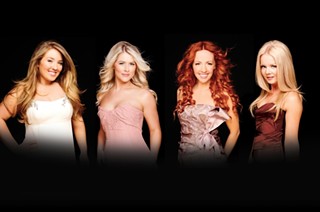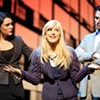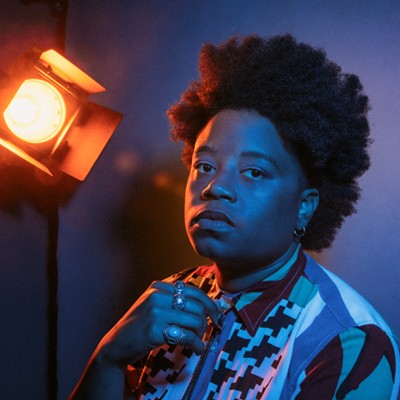If you've been on London's West End over the last seven years or so, it's very likely you saw Susan McFadden on the stage. The Dublin native played Sandy in the theater district's big revival of Grease at the Piccadilly, and followed that up with a year's turn as Elle Woods in the British debut of Legally Blonde: The Musical, at the Savoy.
Susan McFadden was hard to miss for a while.
These days, after years of pretending she wasn't Irish — playing American women on the British stage — the 30-year-old McFadden has come full circle.
She's a Celtic Woman.
Due to America's bottomless fascination with all things Irish, nine years ago one of the musical directors for Riverdance developed a concert show around four female singers and a violinist. These days, Celtic Woman features four fair-haired lasses singing the good old Irish tunes, plus some global and American standards, plus a few choice items from the catalogs of such Gaelic musical lights as Clannad and Enya.
The group tours the world year-round, and has sold more than six million albums. Here in America, their specials are pledge-drive favorites over PBS stations.
McFadden, who made her professional debut at age 11, in Annie at Dublin's Olympia Theatre, joined Celtic Woman in January 2012. She replaced founder Lisa Kelly, who'd gone on maternity leave.
The other CW are Chloe Agnew, Lisa Lambe and Mairead Nesbitt.
(Even if you haven't been within a scone's throw of the West End, you might still have seen Susan McFadden: Before she was 20, she'd toured America several times, as a stepdancer with Irish revues starring singer Tony Kenney, and comedian Noel V. Ginnity.)
You came up through musical theater. Was this a big transition for you — something you didn't see coming?
Susan McFadden: It was a very strange transition for me, and quite a daunting one, I suppose, because I'd always played characters. I've always been able to hide behind the mask of playing a character. So it was quite daunting to be in a production, as it was, as myself. Just being Susan. You have to talk to the audience at certain points in the show, and I used to find that the most nerve-wracking thing — being yourself, talking to the audience. It's taken me about a year now to really get used to that element of it, but I love it. And I can't imagine it being any other way.
When you're growing up in Dublin, are you thinking "To make theater my life, I've got to get to London eventually"?
Susan McFadden: That's the dream. When I was younger I went to Billie Barry, which is a really famous stage school in Ireland. And I grew up in shows and musicals. I used to go to school during the day, and was out working at night from a very young age, in professional shows. You learn so much as a child in theater that you can't learn when you're older. I think you learn grace and etiquette for show business.
But it was definitely always the dream to go to London and be in the West End stage. Because there's a very limited amount of opportunities in Ireland for musical theater. There's not a lot of productions. And there's a lot of competition in the U.K. There's a lot of colleges over there that produce hundreds and hundreds of young performers every year, so there's a fresh batch of talent. It's very competitive.
You won the Grease TV competition. What was that all about?
Susan McFadden: That was the U.K.'s version of the American show Grease Is the Word. They decided to come to England and do the same production over there, where they find their Sandy and their Danny on a TV show. I'd been living in London, and auditioning, and my agent said "I think you should go for this TV show." I really, really didn't want to do things like that. I didn't like the idea of auditioning on television — I like to audition in the privacy of a room, where there's no one watching! Only the panel of people, the director, the producer.
I don't know how it is on Broadway, but in the U.K. it's become very much about having some sort of television background, some sort of profile, before they'll give you the lead in a show.
I just decided to go ahead and do it anyway, not thinking I'd even get past the first round. But I ended up winning the show, and I played Sandy in the West End for a year. And that was what sort of snowballed my career in the U.K. from that point.
Why do you think Legally Blonde was so successful in London? It's such an American story.
Susan McFadden: It was a surprise hit, a massive hit. We couldn't believe it. When it came to opening night we were like "God, is this gonna work over here?" Because it's so American. But it seemed to work better in the U.K. than it did in America. In the U.K., people just seemed to really appreciate the humor.
Did you do it with American accents?
Susan McFadden: Yeah! I've done American accents in nearly every show I've been in. In Legally Blonde, you had to do the Valley Girl L.A. accent, which was kind of fun. I just watched a lot of The Hills before I did it.
So, Celtic Woman. Tell me the story.
Susan McFadden: I knew Lisa Kelly from when I was a teenager, and we kept in touch over the Internet and stuff. And when I had done Annie, Chloe's mother was Mrs. Hannigan. She's a well-known performer and actress in Ireland. Chloe was very young then; she must have been 4 or 5 years old. So that's how I knew Chloe, through her mum.
I'd just finished Legally Blonde, and I got the phone call saying that Lisa was leaving to have her fourth child, and would it be something I'd be interested in? I was so delighted to have an opportunity to go back to my roots, go back to something homegrown, something Irish. Because living in the U.K. for the past seven years I'd been predominantly working with British people, in British productions.
Don't you have to put your theater career on hold to do this?
Susan McFadden: Yeah, but performing is not just about one thing or another. To expand, you have to do lots of different things. I feel like I've learned a new craft, a new stagecraft. Like I said, interacting with the audience as you, as yourself, not a character. So yeah, my acting career is sort of on hold but I'm enjoying it at the moment for what it is, really enjoying the new experiences while they're here. I'm just taking each moment as it comes.
Why do you think this sort of music resonates so much — in the States, especially?
Susan McFadden: I think it's because of history. Nearly every American person you meet is Irish [laughs]. It's very flattering for people to feel that they want to have that connection to your country. It's lovely.
And it's also because with Irish music, we're kind of famous for our storytelling ability. All our songs tell a story. Everyone in the world knows "Danny Boy," and there's a great story within it as well. It's been quite poignant singing it lately, you know, there's been such sadness in the news.
And when you sing songs like "Danny Boy," where it's about someone leaving home with the hope of coming home again one day, and seeing their loved ones ... I think they do resonate with everybody.






























